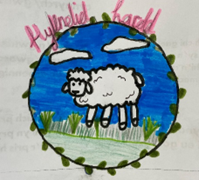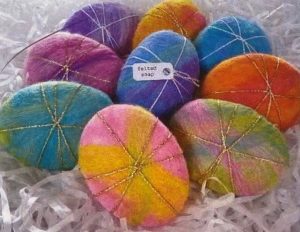Ysgol Pentrecelyn students won the Best Business in Wales award in their first Young Enterprise Fiver Challenge by creating sustainable felted soaps.
The children from Ysgol Pentrecelyn, a small Welsh medium primary school in rural North Wales, are no strangers to enterprise and entrepreneurial thinking. “I definitely want to have my own business when I’m older.” commented Nansi, aged 12.
At an end of year celebration event in July, headteacher Andrew Evans announced the news to students and parents that a team from this school had won the Best Business in Wales award, through Young Enterprise’s Fiver Challenge. This achievement is especially remarkable as this was the first time that Ysgol Pentrecelyn had taken part in the Fiver Challenge, thanks to support from Principality Building Society.
Andrew Evans explained: “When I announced the results of the Challenge at school this evening, the children and their parents were thrilled. One of the girls announced that she felt inspired to start her own business. Our participation will now be an annual event. Thank you for the opportunity the Fiver Challenge has afforded all the children who participated.”
Ysgol Pentrecelyn teaches financial education through a number of routes, including enterprise projects such as school fairs and ‘Coffi Celyn’ (Pentrecelyn branded Fairtrade coffee, the sales from which contribute to school activities and resources).
Teacher Jan Wilson-Jones described how she involved both Key Stages from the school with the Fiver Challenge this year. Five teams each created their own business ideas, from recycling old board games to making bird feeders, bracelets and the winning team of felted soaps.

Hylendid Hardd (beautiful hygiene) created beautiful felted soaps from locally produced wool and locally sourced soaps. Ingeniously designed so the felted wool will shrink in water as the soap is used, the product will gradually reduce in size over its lifetime. Jan Wilson-Jones explained: “The team had sustainability in mind when they designed this product. They have worked with local suppliers to source the wool and the soap. This has reduced the miles involved in transporting products to be manufactured and sold.”
Also winning the award for Best Sales Pitch in Wales, the children spoke about how they had enjoyed the creative process of choosing the product idea, designing the logo and making the felted soaps themselves. In contrast, one team member commented: “Costing the raw materials was difficult, working on the financial side of the business was harder than the creative side.”

The team surveyed students at school and asked parents what they thought of the idea, as well as what they thought customers would expect to pay for the product. When Anna Roberts, local entrepreneur and business founder of Self Storage Booker.com came to visit school, the team asked her guidance on pricing and sales. Anna shared her own entrepreneurial journey with the children, providing invaluable insights and inspiration. During her visit, Anna offered expert advice on how to market and sell their products effectively. She agreed with the team on an ideal price point of £4.50.
The team had already netted sales of £54.00 by the end of the Fiver Challenge period, but expected to increase their profits through sales at a school Talent Show event at the end of term and thanks to the support of a local campsite business, Llanbenwch. With a profit of £3.03 per soap sold, Hylendid Hardd looked set to yield a good return on their initial investment. They planned to reinvest their profits into the business and to make a contribution to Macmillan Cancer Support.
Ysgol Pentrecelyn’s involvement with the Fiver Challenge this year stemmed from a unique financial education project, Seren’s Farm, that the school worked in partnership with Young Enterprise and David Evans (SARN Associates) to deliver between 2022-2024.
Children from Ysgol Pentrecelyn helped to develop the characters, plotline and illustrations for the workbook, ensuring it reflected the features of their rural community. Andrew Evans highlighted the unique features and challenges faced by young people at his school, commenting: “As a small, rural primary school, where farming is at the heart of the community, we wanted to create a resource that truly reflected the features of our local environment. There was no specific resource available, so we decided, with the help of David Evans, to create something unique. The resource we’ve created directly addresses our financial and numeracy skills development needs and is equally valuable for other learners in similar rural environments. We are all very proud to have contributed to the workbook’s development.”
Young Enterprise’s Fiver Challenge features at the centre of the Seren’s Farm workbook, integrating enterprise skills with the development of financial capabilities at the core of this resource. As the 7500 printed copies of the workbook are distributed via workshops at schools across Wales in 2024, the Fiver Challenge will be promoted to communities that may never otherwise access this impactful programme.
Jan Wilson-Jones reflected on the team’s Fiver Challenge success: “We would definitely take part in the Fiver Challenge again and we’re happy to speak to other teams and schools about what’s involved. Next year, now we know what’s involved we would get started earlier in the year. 4 weeks is not long enough!”